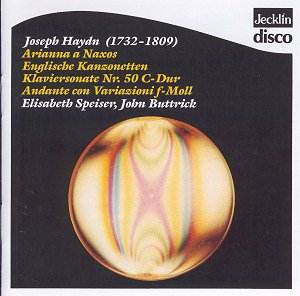All the material in
this recital belongs – more or less
– to the years of Haydn’s visits to
London, between New Year’s Day of 1791
and June 1792 and, again, between February
1794 and mid-August 1795. The earliest
work here, the Cantata Arianna
a Naxos was written in 1789.
During Haydn’s first spell in London
it was performed to great acclaim, with
Haydn accompanying the castrato Gaetano
Pacchierotti. The Andantino
- which Haydn also referred to as a
Sonata and as ‘Un piccolo divertimento’
- was written in 1793. The C Major
Sonata belongs to 1794/5 and
the four English songs to 1795. There
is, therefore, an implicit unity to
the programme. These are the works of
the mature composer, the years of the
‘London’ symphonies, the opp. 71 and
74 string quartets, and some of Haydn’s
finest piano trios, for example. It
is no surprise, then, that there should
be much outstanding music to be heard
on this CD.
The Swiss label Jecklin
seems to be reissuing a number of Elisabeth
Speiser’s recordings. Many will surely
remember Speiser as the Euridice to
Janet Baker’s Orfeo in the Glyndebourne
performance and recording of Gluck’s
Orfeo ed Euridice (a CD
is currently available on Apex), which
was Dame Janet’s farewell to the operatic
stage. Born in Switzerland, Speiser
was an established figure on the European
concert and oratorio circuit, from which
she withdrew quite early. Always a thoroughly
musical and intelligent performer, Speiser
was not perhaps blessed with a voice
of great distinctiveness or power. Here
she is not helped by a recording balance
which sometimes pushes her voice too
far back. I suspect too that most admirers
of Haydn have, in the almost twenty
years since this recording was made,
come to the realisation that Haydn’s
vocal writing is rather better suited
to accompaniment by the fortepiano than
by the modern grand. A far more comfortable
and natural balance is achieved on recordings
such as those by Anne Sofie von Otter
and Melvyn Tan (Archiv) and Catherine
Bott and Melvyn Tan (Meridian) in which
the fortepiano is used. Where recordings
using the modern grand are concerned,
the competition includes Cecilia Bartoli
(with Andras Schiff in outstanding form),
Janet Baker, Bernarda Fink, Arléen
Auger and many more. Speiser is not
quite in that class, especially as regards
variety of tone and colour, but hers
is an interesting performance of one
Haydn’s miniature masterpieces, without
ever quite achieving that compelling
mixture of surprise and inevitability
that the very finest performances of
this cantata have.
Speiser sings the English
canzonettas attractively, though the
diction is not always quite as clear
as it might be. Again, for all the considerable
sensitivity of John Buttrick’s playing,
the modern grand cannot compete with
the fortepiano in, for example, the
evocation of the ‘ghostly’ sounds of
‘The Spirit’s Song’ - just as some of
the imitative effects in the piano part
of Arianna generally work
better on the earlier instrument.
In the solo piano pieces
the use of the modern grand troubles
one less. These mature piano pieces
can be made to work very well on the
modern instrument. There are, after
all, fascinating recordings of the Sonata
by both Richter and Gould and – a little
more ‘mainstream’ – by Schiff. Buttrick’s
control of dynamics is impressive and
he can develop melodic lines with attractive
lucidity. Both the Sonata and the marvellous
Andantino are given very professional
performances, eminently listenable (and
re-listenable).
This an interesting
programme, very competently performed;
there are, though, better performances
to be found elsewhere of all the pieces
here.
Glyn Pursglove


